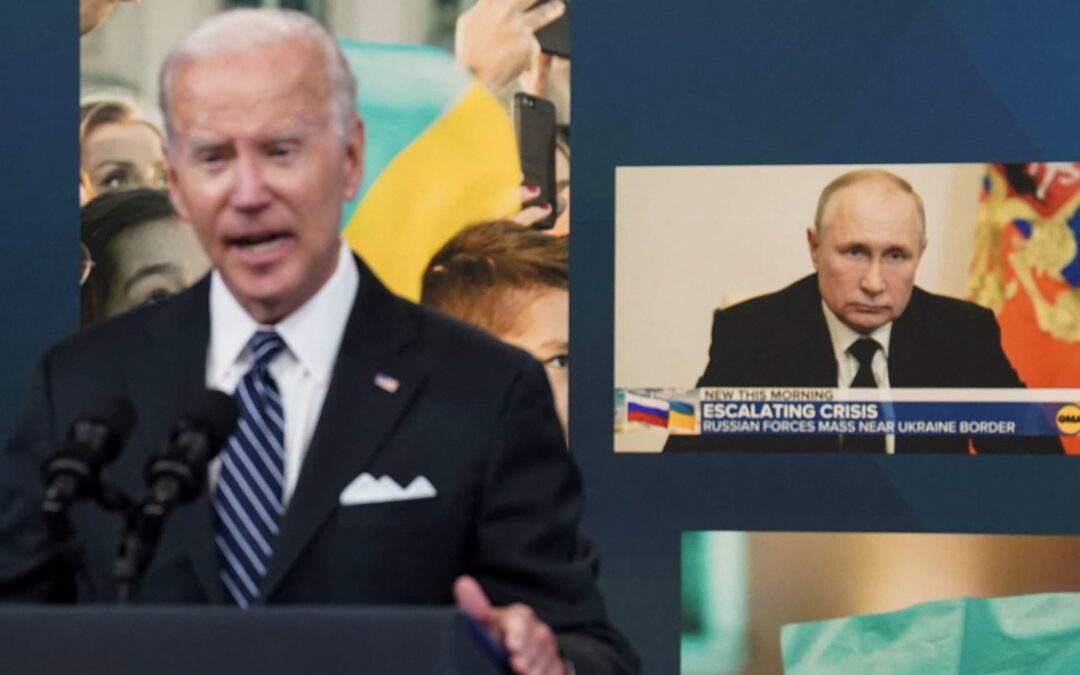Russia’s President Vladimir Putin is seen on a display in the background as U.S. President Joe Biden speaks about “gas prices and Putin’s Price Hike” during remarks in the Eisenhower Executive Office Building’s South Court Auditorium at the White House in Washington, U.S., June 22, 2022.Â
Kevin Lamarque | Reuters
Russian President Vladimir Putin said he preferred Joe Biden as the next U.S. president over Republican frontrunner Donald Trump, who fell under intense scrutiny for his relationship with the Kremlin during his presidency.
“[Biden] is more experienced and more predictable. He is an ‘old school’ politician. But we will work with any US leader, elected by the people of America,” Putin told journalist Pavel Zarubin late Wednesday, according to Russian state-controlled news outlet Tass.
The Trump and Biden presidential campaigns did not immediately respond to CNBC’s requests for comment.
Putin’s comments followed a week of international controversy over Trump’s recent NATO remarks and mounting tensions between U.S. Democrats and Republicans over a $95 billion aid package that includes military aid to Ukraine.
The Kremlin head of state will stand in his own election on 15-17 March, but is widely expected to clinch another presidential mandate after leading Russia as prime minister or head of state since 1999.
In the same interview, Putin also appeared to dismiss recently mediatized concerns over Biden’s mental acuity after Department of Justice special counsel Robert Hur said the White House leader “willfully retained and disclosed classified materials” and exhibited poor memory during a relevant interview. Biden has disputed the claims.
Referencing their meeting in Geneva, Switzerland, in 2021, Putin said he had noticed no signs of incapacity from Biden. “Yes, he was peeking at his notes from time to time, but, frankly speaking, I was peeking at mine as well,” Putin said, adding that there were “reports of [Biden] banging his head on the helicopter while leaving it, but who didn’t?”
Despite these apparently favorable comments, Putin stressed ongoing disagreement with Biden’s politics, saying “the incumbent administration’s approach is most harmful and erroneous.”
Biden assumed office roughly one year before Moscow’s ongoing full-scale invasion of Ukraine in February 2022. His administration has staunchly backed Kyiv with military and financial aid, and Biden has led the White house through a period of deteriorating relations with the Kremlin.
Putin has in turn distanced Moscow from Western countries â which have overwhelmingly sanctioned Russia and its officials â and sought fresh ties with various emerging markets, especially China and Iran.
Putin’s apparent stance of distancing himself from Trump is notable given historical questions over the strength of the pair’s relationship. Trump was probed during a nearly two-year special counsel investigation of Russian interference in the election that he won. The former president repeatedly denied claims that he had fallen under the Kremlin’s influence.
During a campaign rally in South Carolina late last week, Trump signaled that he would “encourage” Russia “to do whatever the hell they want” to a country member of the NATO military coalition that did not meet its defense spending commitments â triggering widespread international outrage and criticism from NATO chief Jens Stoltenberg that his comments are undermining the security of all NATO allies.
Biden characterized Trump’s comments as “dumb,” “shameful,” “dangerous” and “un-American,” suggesting a close connection between the former U.S. president and the Russian head of state, and introducing distance between himself and Putin.Â
“Can you imagine? A former president of the U.S. saying that? The whole world heard it. The worst thing is he means it. No other president in our history has ever bowed down to a Russian dictator. And let me say this as clearly as I can: I never will,” Biden said.
The broader Republican party’s support of Ukraine faces an imminent test after a $95 billion bill passed by 70-29 in the Democrat-led U.S. Senate earlier this week. The aid package â which includes assistance for Ukraine, Israel and Taiwan â must win support from the Republican-helmed House of Representatives before becoming law.









